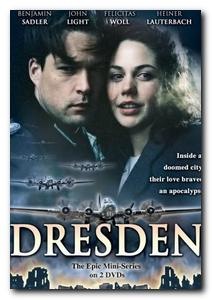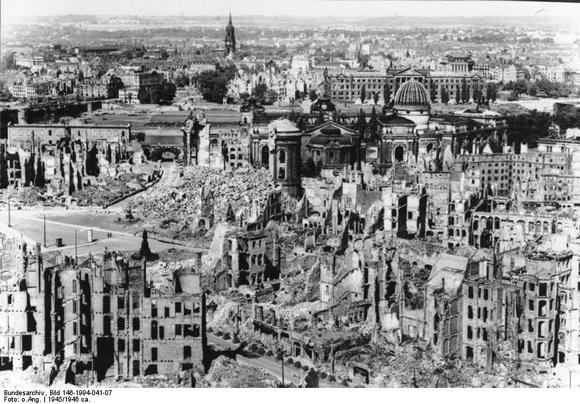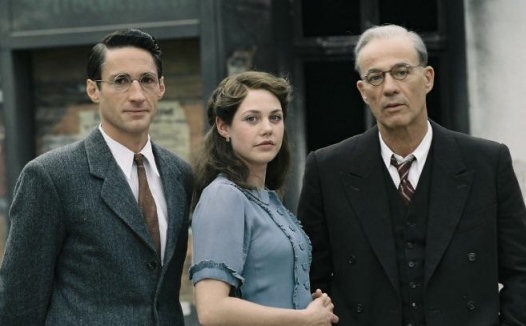 Dresden (2006) – on rental DVD. One of the tragic outcomes of the second world was the devastation of German cities rich in art, history, music and culture. Dresden was one such city. The city had been spared off Allied bombing offensives. Until Feb 1945 in what was to be one of the most controversial actions of the war, when thousands of British and American bombers hit Dresden with incendiary and high explosives.
Dresden (2006) – on rental DVD. One of the tragic outcomes of the second world was the devastation of German cities rich in art, history, music and culture. Dresden was one such city. The city had been spared off Allied bombing offensives. Until Feb 1945 in what was to be one of the most controversial actions of the war, when thousands of British and American bombers hit Dresden with incendiary and high explosives.
The resulting firestorm claimed between 24,000 to 40,000 lives. The inferno was so immense and fires so prevalent that civilians seeking refuge in bomb shelters were literally cooked. Others running in the streets were simply incinerated. The fires reached temperature highs of 1,500 degree celsius and all but destroyed the historic city.
After the war, many questioned whether the destruction of Dresden through bombing was necessary or justified. Victory over Nazi Germany at that point in the war was a matter of time with the Luftwaffe air force a pale comparison of what it used to be, and allied armies on the ground already closing on Berlin. The capitulation of Germany wasn’t an “if” but a “when”. Moreover, while the city’s total destruction sent shivers up Hitler’s crew, the German populace did not break in morale nor, as one author claimed, allow a single Allied soldier to advance further into Germany.
——
While there’s been in the last decade several film and TV productions of the European theatre of operations in World War II, there’s been far fewer recent productions on the air war over Europe. There was Tmavomodrý svet (Dark Blue World), the Polish film about Pole pilots in the Battle of Britain – a film I enjoyed – but not many I’ve seen besides that in the last couple of years.
Dresden is actually a 2.5 hour film made for TV, and comes as quite a nice find. It’s not, surprisingly, a Hollywood but a German production with a cast drawn from both Germany and Britain. I have high regard for German productions telling stories of the war. Perhaps as a result of the circumstances of their defeat in 1945 and their national psyche in the aftermath, their productions have invariably been sincere and often accurate retellings of the war experience. I’m thinking of films like Das Boot, Stalingrad, Der Untergang – the latter of which has a Hitler scene which has been heavily parodied on Youtube – and the very recent Sophie Scholl.

The story in Dresden centers on the romance between British pilot, Robert, who during a raid parachutes from his doomed bomber, and a German nurse, Anna, in Dresden. The story is told not just from a singular point of view but several: Anna’s, her fiancé’s, Robert’s, their friends, and even the British war room strategists planning the Dresden operation. Their romance never feels forced but progresses naturally throughout that by the end of the film, you’ll feel deeply for both.
The conversations, dialog and scenes feel like real and accurate representations of sentiments on both sides during the war. The professionalism of the British bomber crews as they loaded up, fought and died in their Lancaster bombers, and both the optimism and pessimism displayed by varying German civilian characters. There’s the ruthlessness and depravity of the Nazi regime. A good portion of the film also takes place in the German hospital where Anna works, and the scenes where injured soldiers and civilians are brought in are heart wrenching.
There were also many moments that one doesn’t see very often on-screen. Firstly, war propaganda existed on both sides during the actual conflict, but rarely does one see German film footage extolling the amazing abilities of Hitler’s secret weapons on screen. But this production has them in one scene. There’s also another scene where a Hitler brownshirt and two Gestapo officers looking for spies stand-off. The dialog is kept simple but in that short scene, the underlining tensions between rival factions in Nazi Germany is illustrated very well. Thirdly, there’s a scene where German soldiers arrest a woman who tried to hide her army deserter husband, and Anna’s attempts to protect her. Very touching.

The film also employs a mix of actual war-time footage and CG. The old and dated footage doesn’t always blend well with the newly filmed portions, but the CG work is great for a TV production. I certainly don’t see very often Lancaster bombers on screen, even if computer-generated! The music soundtrack deserves a special mention too: it complements well the film.
Dresden doesn’t attempt to sway viewers to the controversy over whether the bombing was justified or not too. It merely provides the viewpoints of the parties concerned, and let viewers decide.
But ultimately, this film is actress Felicitas Woll‘s as Anna. Her incredibly riveting performance never feels false as she portrays the nurse conflicted between her responsibilities as a healer, her love for her family, her fiancé, and the Englishman.
——
I missed Tom Cruise’s Valkryie on the big screen. While that film is about the botched bombing assassination plot on Hitler, one theme it shares with Dresden is sentiment on the German populace and ground. I’m not hopeful though, knowing Hollywood productions. But I’ll review it when the film shows up on rental too.
I’m also reminded of Michael Bay’s Pearl Harbor which shared some similar themes: of a nurse caught between her love for two men in the backdrop of the war. Pearl Harbor was a one star for me. Dresden gets all 



 of five stars.
of five stars.
A Youtube video segment from the film: